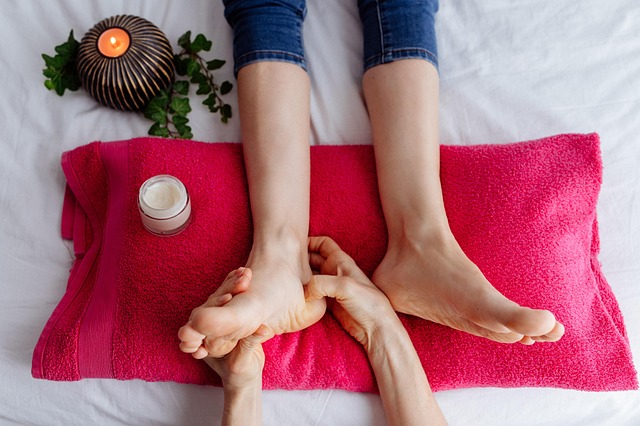Anxiety disorders, affecting daily living with persistent fear and worry, include various forms like GAD, panic disorder, social anxiety, specific phobias, and PTSD. Recognizing these distinct forms is vital for effective anxiety treatment, enabling professionals to offer tailored counseling and support addressing underlying causes. Counseling, including CBT, exposure therapy, mindfulness practices, and group therapy, provides tools for managing and overcoming anxiety, improving symptoms and quality of life. A supportive environment, deep breathing, mindfulness meditation, holistic self-care, and professional help are key components of successful anxiety treatment.
Anxiety disorders affect millions, yet understanding their various forms and symptoms is crucial for effective support. This comprehensive guide explores anxiety treatment through counseling, delving into diverse therapy approaches, and building supportive environments. We discuss techniques for coping with anxiety attacks, lifestyle changes for long-term management, and the importance of self-care. Learn how to seek professional help, overcome stigma, and take the first steps towards recovery with our expert insights on anxiety treatment.
Understanding Anxiety Disorders: Types and Symptoms

Anxiety disorders are a group of mental health conditions characterized by persistent, excessive fear and worry that interfere with daily living. They encompass various types, each with its unique set of symptoms. Generalized Anxiety Disorder (GAD) involves excessive and uncontrollable concern over everyday matters, leading to restlessness and difficulty concentrating. Panic Disorder is marked by recurrent and unexpected panic attacks, intense periods of fear accompanied by physical symptoms like rapid heartbeat and sweating. Social Anxiety Disorder, as the name suggests, causes significant distress in social situations due to fear of judgment or embarrassment.
Specific Phobias, another type, involve intense fear of specific objects or situations, such as heights or flying. Post-Traumatic Stress Disorder (PTSD) can develop after traumatic events, causing flashbacks, nightmares, and extreme anxiety related to the trauma. Recognizing these distinct types is crucial in determining effective anxiety treatment. Understanding symptoms enables professionals to provide tailored counseling and support, addressing the root causes of anxiety for better management and improved quality of life.
The Role of Counseling in Managing Anxiety

Counseling plays a pivotal role in managing and overcoming anxiety, offering individuals a safe space to explore and understand their feelings. Through therapeutic conversations with trained professionals, individuals can gain valuable insights into the root causes of their anxiety and develop effective coping strategies. This process allows for a more profound awareness of triggers and thought patterns, empowering people to challenge negative beliefs and replace them with healthier alternatives.
By engaging in regular counseling sessions, one can learn relaxation techniques, cognitive-behavioral therapies, and mindfulness practices tailored to their specific needs. These evidence-based methods have proven effective in anxiety treatment, helping individuals manage symptoms, improve overall well-being, and enhance their quality of life. Counseling provides a supportive environment, enabling people to navigate their anxiety journey with increased confidence and resilience.
Different Therapy Approaches for Anxiety Relief

Anxiety relief can be achieved through various therapy approaches, tailored to meet individual needs. Cognitive Behavioral Therapy (CBT) is a widely recognized method that focuses on identifying and changing negative thought patterns and behaviors contributing to anxiety. By challenging distorted thoughts and learning coping strategies, individuals gain better control over their emotions and experiences. Another effective approach is Exposure Therapy, which gradually exposes people to feared situations or objects in a safe environment, helping them overcome their fears and reduce avoidance behaviors.
Mindfulness-based therapies, such as Mindfulness-Based Stress Reduction (MBSR) and Acceptance and Commitment Therapy (ACT), have gained prominence for their ability to enhance present-moment awareness and acceptance. These practices encourage individuals to observe their thoughts and feelings without judgment, fostering a sense of calm and resilience in the face of anxiety. Additionally, group therapy provides a supportive environment where individuals can share experiences, learn from others, and benefit from collective understanding, making it a valuable component of anxiety treatment.
Building a Supportive Environment for Effective Treatment

Creating a supportive environment is paramount for effective anxiety treatment. This involves fostering an atmosphere of warmth, empathy, and non-judgment where individuals feel safe to express their fears and concerns openly. A therapeutic setting that encourages active participation and collaboration between client and counselor enhances the process. When people suffering from anxiety perceive their surroundings as welcoming and understanding, they’re more likely to engage in treatment, share personal experiences, and benefit from various interventions like cognitive-behavioral therapy or mindfulness practices.
Such an environment also facilitates trust and transparency, encouraging individuals to explore the root causes of their anxiety without hesitation. This includes addressing any underlying issues that might have contributed to the development of anxiety disorders, be it past traumas, stress factors at work or home, or other personal challenges. By providing a supportive space, counselors enable clients to embark on a journey of self-discovery and healing, ultimately enhancing the effectiveness of anxiety treatment.
Techniques to Cope with Anxiety Attacks

Anxiety attacks can be overwhelming, but there are numerous coping techniques that offer effective anxiety treatment. One powerful method is deep breathing exercises, which help to calm the mind and body by slowing heart rate and reducing symptoms of panic. Simply focusing on slow, controlled breaths for several minutes during an attack can make a significant difference.
Another useful technique is mindfulness meditation, which encourages individuals to stay present and observe their thoughts without judgment. This practice allows people to recognize when they’re engaging in anxious thinking patterns and gently redirect their focus back to the moment. Mindfulness has been shown to reduce anxiety symptoms over time and is an accessible coping tool that can be used anywhere, anytime.
Lifestyle Changes for Long-Term Anxiety Management

Anxiety management isn’t just about short-term relief; it’s a journey towards long-lasting well-being. Beyond therapy and counseling sessions, adopting certain lifestyle changes can significantly aid in anxiety treatment and prevention. One key aspect is prioritizing self-care, which includes maintaining a balanced diet, engaging in regular physical activity, and ensuring sufficient sleep. These habits not only boost overall health but also provide a solid foundation to combat anxious thoughts.
Additionally, stress management techniques such as mindfulness meditation, deep breathing exercises, or yoga can go a long way in reducing anxiety levels. Incorporating these practices into daily routines allows individuals to cultivate a sense of calm and develop coping mechanisms for managing stressful situations. Remember, consistency is crucial; making these lifestyle changes part of your routine can lead to lasting improvements in mental health and overall quality of life.
Integrating Self-Care into Your Anxiety Journey

In the journey towards managing and overcoming anxiety, integrating self-care practices is an essential component of effective anxiety treatment. Beyond traditional counseling sessions, dedicating time to nurture yourself can significantly enhance your overall well-being and resilience against anxious episodes. Self-care looks different for everyone; it could be as simple as setting aside moments each day for mindfulness exercises, engaging in physical activities you enjoy, or connecting with loved ones. These practices help to reduce stress levels, improve mood, and promote better sleep—all of which are vital components in managing anxiety.
Regular self-care routines empower individuals to take charge of their mental health. By prioritizing personal needs, one can develop coping mechanisms that go beyond therapy sessions. Activities like journaling, spending time in nature, practicing hobbies, or adopting a healthy diet contribute to a holistic approach to anxiety treatment. This proactive stance fosters a sense of control and empowers individuals to navigate their anxiety with greater ease and confidence.
Seeking Professional Help: Finding the Right Counselor

Seeking professional help for anxiety is a significant step towards managing and overcoming this common condition. Finding the right counselor or therapist can make all the difference in your journey to improved mental health. Many people find comfort and effective strategies through various forms of counseling, such as cognitive-behavioral therapy (CBT), which has proven successful in treating anxiety disorders.
When looking for a counselor, consider specialists who focus on anxiety treatment. Ask for recommendations from trusted sources, check their qualifications and experience, and ensure they align with your needs. The right therapist will create a safe space, offer evidence-based techniques, and provide personalized support tailored to your specific challenges.
Overcoming Stigma and Taking the First Step Towards Recovery

Overcoming the stigma surrounding mental health issues is a vital step in anyone’s journey towards recovery from anxiety. Many individuals suffer in silence, afraid to seek help due to societal perceptions and fears of judgment. This reluctance can prolong the struggle with anxiety, making it even more challenging to manage. However, taking that initial step towards seeking counseling or therapy is incredibly brave and empowering. It involves acknowledging the problem and actively choosing to take control of one’s mental well-being.
Anxiety treatment is a powerful tool that offers individuals the space to explore their feelings, understand triggers, and develop coping strategies. Through professional guidance, people can learn effective techniques to manage anxiety symptoms, improve their quality of life, and regain a sense of control. Remember, reaching out for help is not a sign of weakness but a courageous act of self-care.
